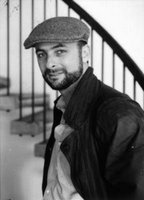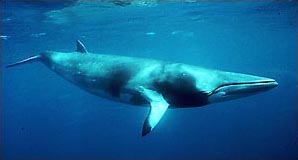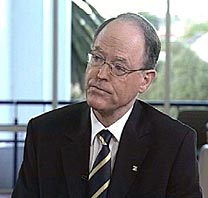 When I was away camping, I spent many of the frequent periods of recouperation reading David Brin's science fiction novel Earth. The author is a former consultant to NASA and graduate-level physics professor, so when it comes to science, one can be confident he knows what he's talking about. The range of themes covered in-depth by the epic also proves that Brin has a solid grasp on sociological dissection. Earth is futurist Brin's depiction of one possible future of the planet, set in 2038.
When I was away camping, I spent many of the frequent periods of recouperation reading David Brin's science fiction novel Earth. The author is a former consultant to NASA and graduate-level physics professor, so when it comes to science, one can be confident he knows what he's talking about. The range of themes covered in-depth by the epic also proves that Brin has a solid grasp on sociological dissection. Earth is futurist Brin's depiction of one possible future of the planet, set in 2038.
What is probably one of the most compelling, and at the same time chilling, factors about this book is that it was first published in 1990, and yet already many of Brin's predictions for the far future have come true, including -- but not limited to -- the rise of an international data network (the Internet) to intense prominence in world citizens' day-to-day lives and, most unfortunately, the drowning of New Orleans.
New Zealand holds a pivotal role in the novel to boot, with significant events taking place in the ground underneath the volcanic plateau in the central North Island, and even in the Waitomo Caves. The cavitronic operation to remove a theoretically-inspired micro black hole from the Earth's core, which provides the locus to the story, is overseen by a highly successful Maori entrepreneur named George Hutton. It's good to see someone depicting a positive, prosperous future for Maori for once, especially without neglecting to furnish the character with the appropriate cultural allegiance and pride.
Our culture's depiction in the novel is even more heartening in that Brin paints the country as a true environmental oasis in his carefully and thoughtfully constructed idea of a future world. It's one of the few places remaining on the entire globe where legally designated "quiet zones" are not needed to be established in pieces of wilderness in order to create locations where there are no intrusive influences of technology, such as the sounds of jets flying over and the like. New Zealand's rainforests are rendered as among the most healthy prosperous in the world, having not suffered the massive die-offs and climate changes evident in other countries.
I found Brin's forays into the philosophy of the mind to be of particular relevance to what I have been thinking about recently. The idea is that I apparently do not know my "self" well enough to be able to properly express who I really am, and as a result people close to me are getting the impression that I am holding back. In the novel, Doctor Jen Wolling and her young student Nelson Grayson discuss the status of "the self" in the human mind:
[Nelson said] "We talked before about how--how the cells in my body compete and cooperate to make a whole person. And I been reading some of those theories 'bout how individual people could be looked at the same way ... like, y'know, organs or cells cooperating and competing to make up societies. And how the same ... metaphor--"
"How the same metaphor's been applied to the role species play in Earth's ecosphere, yes. Those are useful comparisons, so long as we remember that's all they are. Just comparisons, similes, models of a much more complicated reality."
He nodded. "But now you're sayin' even our minds are like that?"
"And why not?" Dr. Wolling laughed. "The same processes formed complexity in nature, in our bodies, and in cultures. Why shouldn't they work in our minds as well?"
Put that way, it sounded reasonable enough. "But then, why do we think we're individuals? Why do we hide from ourselves the fact we're so many inside? What's the me that's thinkin' this, right now?"
My inclusion of this excerpt serves to introduce in reasonably-easy-to-understand terms the theoretical concept that the human mind, as opposed to consisting of a single self, is rather made up of a countless number of subselves, all competing to establish themselves as the consciousness -- that is, the limited few aspects of a person's mind that are outwardly expressed. The subselves are also cooperating in a sense whilst they engage in this competition, as it directly results in them constantly increasing in complexity and clarity for the purposes of outdoing each other. The collection of highly developed subselves or metaphorical "organisms" that results, is "the mind." Later on in Brin's narrative, Wolling goes on to consider why people feel the need to identify a singular self, or identity, that may be attributed to their mind.Our subselves usually aren't distinct, except in multiple personality disorder. Rather, a normal person's drives and impulses merge and cleave, marry and sunder, forming temporary alliances to make us feel and act in certain ways.
So far so good. The evidence for some form of multimind model was overwhelming. But then came the rub.
If I consist of many, why do I persist in perceiving a central me at all! What is this consciousness that even now, as I think these thoughts, contemplates its own existence?
Jen remembered back when Thomas had tried to interest her in reading novels. He had promised that the best ones would prove enlightening. That their characters would "seem to come alive." But the protagonists were never realistic to Jen. Even when portrayed as confused or introspective, their thought processes seemed too straightforward. Too decisive. Only Joyce ever came close to depicting the real hurricane of internal conflict and negotiation, those vast, turbid seascapes surrounding an island of semi-calm that named itself "me."
Is that why I must imagine a unitary self? To give the storm a center? An "eye" to revolve around? An illusion of serenity, so the storm might be ignored most of the time? Or is it a way to rationalize a semblance of consistency? To present a coherent face to the outside world?
Most all of us seek to identify "a unitary self" for the reasons described here. These reasons partially explain why it has been suggested to me that I try and discover myself further; because people are not seeing much of a "coherent face" being expressed. Bearing Brin's theories in mind, however, and if they were to be true, this would essentially indicate that the effort that any of us is making is futile -- including my own. The fact that the subselves are endlessly competing and changing means that there is never a solid unitary self. So that would entail that consistency is actually impossible to achieve, and this is why such an undefined image of my mind is projected for other people to behold. In order for people to really "know" each other, the entire mass of subselves would have to be expressed at once; and of course that expression would be mindbogglingly complex to the point that nobody would be able to comprehend it anyway.
People want to be able to identify those close to them by associating them with sets of attributes that the subject outwardly expresses with the need for comprehensibility in mind. But as long as comprehensibility is regarded as of importance, only a handful of anyone's subselves are being exhibited. The true unitary self comprises the absolute entirety of the mind -- that's all of the countless subselves. In other words, ultimately, it could be argued that it's impossible to truly know one's self, let alone someone else's, because it is complex beyond the comprehension ability of the human mind. I, along with everyone else, "hold back" from partaking in overtly revealing expression for comprehensibility's sake. As an afterthought, it's interesting to consider that people with multiple personality disorders -- "insane" people -- are actually giving air to more of their subselves than "sane" individuals. That gives you an idea how confusing the world would be if everyone really knew everyone else. Everybody would seem even more incoherent. I'm extremely interested to hear your thoughts, whether about my situation, your own, or the overall theory. Do you think we should all stop trying to pin our respective unitary selves down? Is the task that I've just taken on with renewed fervour a proverbial wild goose chase? If you think you might be interested in reading David Brin's Earth, and if what you've heard about it here hasn't been enough to convince you to look into it, there is a sample in the form of the first ten chapters on the author's Web site.
 Rodney offered a few days ago a piece of commentary that I feel compelled to refer back to, due to the fact that I found it to so skew the perceived response to the issue in question. What happened, according to the Herald article, is that on 24 November a Dutch tourist allegedly cracked a "nervous grin" during a traditional Maori welcoming ritual. Other reports suggest that he was showing an expression of disrespectful amusement towards what was going on. One performer in the welcome, Richard Minarapa Mitai-Ngatai, impulsively took the latter to be the factual case and proceeded to assault the tourist by headbutting him in the face.
Rodney offered a few days ago a piece of commentary that I feel compelled to refer back to, due to the fact that I found it to so skew the perceived response to the issue in question. What happened, according to the Herald article, is that on 24 November a Dutch tourist allegedly cracked a "nervous grin" during a traditional Maori welcoming ritual. Other reports suggest that he was showing an expression of disrespectful amusement towards what was going on. One performer in the welcome, Richard Minarapa Mitai-Ngatai, impulsively took the latter to be the factual case and proceeded to assault the tourist by headbutting him in the face.




 I read
I read 






